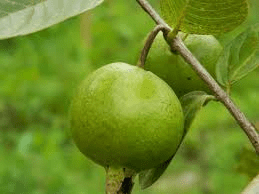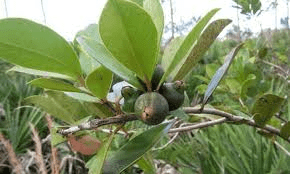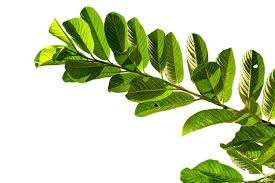The guava peduncle, also known as the pedicel, is the stalk that connects the guava fruit to the plant’s branch. While it may seem like a minor part of the guava plant, the peduncle plays a crucial role in the plant’s reproductive system and offers several noteworthy benefits and characteristics.
Structurally, the peduncle supports the fruit and facilitates its growth by connecting it to the branch. This support system ensures that the guava fruit remains attached to the plant until it is fully mature and ready for harvest. The peduncle also helps transport nutrients and water from the plant to the developing fruit, which is essential for its growth and development.
From a medicinal and nutritional standpoint, the guava peduncle is not as widely studied as other parts of the guava plant, such as the leaves or fruit. However, it still contains several bioactive compounds that contribute to its potential health benefits. The peduncle, like other parts of the guava plant, may contain antioxidants, including flavonoids and polyphenols, which help combat oxidative stress and reduce the risk of chronic diseases.
Additionally, the guava peduncle has been noted for its potential antimicrobial properties. It contains compounds that may help inhibit the growth of certain bacteria and fungi, contributing to its potential use in traditional medicine. These antimicrobial effects could make the peduncle beneficial for promoting oral health and treating minor skin infections.
Another potential benefit of the guava peduncle is its role in traditional remedies for digestive health. Some traditional practices use parts of the guava plant, including the peduncle, to help manage digestive issues such as diarrhea. The astringent properties of the peduncle can help reduce fluid secretion in the intestines and inhibit the growth of harmful bacteria, promoting a healthy digestive system.
To utilize the guava peduncle for its potential health benefits, it can be prepared in various ways. One common method is to make an herbal infusion or decoction by boiling the peduncle in water. This preparation can be consumed as a tea to support digestive health or to take advantage of its potential antimicrobial properties. Additionally, extracts or powders made from the guava peduncle can be used in supplements for a more convenient option.
In summary, the guava peduncle plays a vital role in supporting and connecting the guava fruit to the plant. While it may not be as well-studied as other parts of the guava plant, it still offers potential health benefits, including antioxidant and antimicrobial properties.
By incorporating the guava peduncle into traditional or modern health practices, individuals can explore its medicinal advantages and support overall well-being. Whether through herbal preparations or supplements, the guava peduncle presents an interesting aspect of the guava plant with valuable health potential.
The Economic Importance and Uses of Guava Peduncles

1. Construction Material: Guava peduncles are strong and can be used in small-scale construction, like making trellises and supports.
2. Handicrafts: They are utilized in creating handicrafts such as decorative items, baskets, and small furniture.
3. Firewood: Guava peduncles are used as a source of firewood, providing fuel for cooking and heating.
4. Charcoal Production: They can be processed into charcoal, which is used as a fuel and in various industrial applications.
5. Natural Medicine: In traditional medicine, guava peduncles are used to treat digestive issues and inflammation.
6. Animal Fodder: Young guava peduncles can be fed to livestock as a supplemental feed.
7. Biochar: Guava peduncles can be converted into biochar, which is used to enhance soil fertility and sequester carbon.
8. Mulch: Shredded peduncles are used as mulch to retain soil moisture and suppress weeds.
9. Compost: They can be composted to create organic fertilizer, enriching soil with nutrients.
10. Eco-friendly Packaging: Guava peduncles can be processed into biodegradable packaging materials.
11. Potpourri: Dried guava peduncles are used in potpourri for their aroma and decorative purposes.
12. Natural Dyes: They can be used to create natural dyes for textiles and crafts.
13. Support Structures: Peduncles can be used as stakes or supports for climbing plants.
14. Biomass Energy: Guava peduncles are used as biomass for generating renewable energy through combustion or gasification.
15. Livestock Bedding: Dried peduncles can be used as bedding material for livestock.
16. Artistic Sculptures: They can be used by artists to create sculptures and other art pieces.
17. Environmental Conservation: Planting guava peduncles helps prevent soil erosion and stabilize land.
18. Natural Pest Repellent: Guava peduncles can be processed into natural pest repellents to protect crops.
Read Also: Hydroponics Garden Complete Beginners Guide
The Products and By-products That Can Be Derived From Guava Peduncles

1. Charcoal: Guava peduncles are carbonized to produce charcoal used as a fuel and in industrial processes.
2. Firewood: Peduncles are cut and dried to be used as firewood for cooking and heating.
3. Handicrafts: Guava peduncles are crafted into various items like baskets, furniture, and decorations.
4. Biochar: They are pyrolyzed to create biochar, which enhances soil fertility.
5. Mulch: Shredded peduncles are used as mulch to conserve soil moisture and control weeds.
6. Compost: Guava peduncles are composted to produce nutrient-rich organic fertilizer.
7. Eco-friendly Packaging: They can be processed into biodegradable packaging materials.
8. Potpourri: Dried peduncles are used in potpourri mixes for their aroma.
9. Natural Dyes: Peduncles are used to extract pigments for dyeing textiles.
10. Support Structures: They serve as stakes or supports for climbing plants.
11. Biomass Energy: Guava peduncles are used as biomass for renewable energy production.
12. Livestock Bedding: Dried peduncles are used as bedding material for livestock.
13. Artistic Sculptures: Artists use guava peduncles to create sculptures and other art pieces.
14. Natural Pest Repellents: Extracts from peduncles are used to create natural pest repellents.
15. Environmental Conservation Tools: Peduncles are used in projects to prevent soil erosion.
16. Natural Medicine: Peduncles are used in traditional medicine for various health treatments.
17. Biofuel: They can be converted into biofuel through fermentation or other processes.
Read Also: What are the Benefits of Hydroponic Farming?
Frequently Asked Questions (FAQ’s) About Guava Peduncles

1. What are guava peduncles used for?
Guava peduncles are used in construction, handicrafts, firewood, charcoal production, and natural medicine.
2. How are guava peduncles used in traditional medicine?
They are used to treat digestive issues and inflammation due to their medicinal properties.
3. Can guava peduncles be used as animal feed?
Yes, young guava peduncles can be fed to livestock as a supplemental feed.
4. What is biochar, and how is it made from guava peduncles?
Biochar is a type of charcoal made by pyrolyzing guava peduncles, used to enhance soil fertility.
5. How are guava peduncles utilized in eco-friendly packaging?
They are processed into biodegradable materials for packaging, reducing plastic use.
6. Can guava peduncles be used as mulch?
Yes, shredded peduncles are used as mulch to conserve soil moisture and suppress weeds.
7. How do guava peduncles contribute to biomass energy?
They are used as biomass for generating renewable energy through combustion or gasification.
8. Are guava peduncles used in art?
Yes, artists use guava peduncles to create sculptures and other art pieces.
9. How are guava peduncles processed into natural pest repellents?
Extracts from guava peduncles are used to create natural pest repellents for crops.
10. What are the benefits of using guava peduncles as compost material?
They are composted to produce nutrient-rich organic fertilizer, improving soil fertility.
Read Also: Waste To Fertilizer: What You Need to Know

